Many of us are not that lucky to live in areas where weather conditions are perfect. But it seems that the drought-ridden regions are creating the biggest damages.
And when the dry weather is good for our house-building, it is not favorable for our yards and gardens at all.
A drought-tolerant landscape is a solution to the problem of lack of water and moisture.

Before showing you the 12 Best Drought-Tolerant Landscaping Ideas, let us answer the most frequently asked questions that will focus more on this problem and its solution.
- What is drought tolerant?
Drought tolerance is the degree to which a plant is adapted to arid or drought conditions. Drought resistant landscaping means conserving water as much as possible and maintaining all components – plants, grass, flowers – alive and growing.
- What is the most drought tolerant grass?
A University of California states that the most drought tolerant grass for lawns is hybrid Bermuda grass. There are also some drought resistant plants which you can use – like succulents.
- How much does it cost to put in drought tolerant landscaping?
Around $2-$3 per square foot, which includes lawn removal, installation, and sufficient irrigation – it really depends on your conditions. Or you can DIY and save a lot of money.
- Where to buy drought-tolerant plants or grass?
You already know the answer – your local gardening center, where they will give you a professional advice on the plants suitable for your landscaping project.
- Does a landscape have to be re-planted with specific drought resistant or native plants to save water?
No. Highly drought-resistant plants can survive extended periods with no precipitation or irrigation, but this does not mean they can provide acceptable landscape function and performance with no water. More answers from the University of California on drought tolerant plants and saving water – here.
- What is Xeriscape landscaping?
Xeriscaping is landscaping that reduces or eliminates the need for supplemental water from irrigation. Derived from the Greek eros meaning “dry,” it means literally “dry landscape.”
- Do I need a drought-tolerant landscaping for my garden/backyard / front yard?
It depends on the area you live in, a number of sunny days per year, precipitation, year-round temperature… you can use the online Drought Monitor to check live data for your area.
Now, let’s start with our selection of drought-tolerant landscaping ideas:
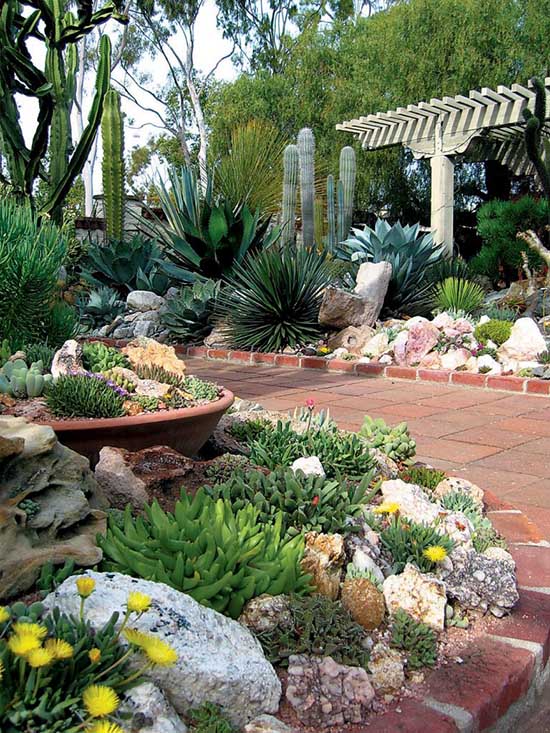
Photo: Credit
For the gardeners who are looking for intriguing drought tolerant front yard ideas, the succulents may be the right answer!
As a real space- and water-savers, they are considered as the highest growth category in the nursery business, even surpassing the vegetable category.
With their rich variety of sculptural shapes and colors, succulents offer a lot to gardeners looking for interesting drought-resistant plants.
Once established, most of the succulent species require watering once a month.
However, you should consider the challenges (too cold, too sunny, too moisturized) they may face before planting them in your yard.
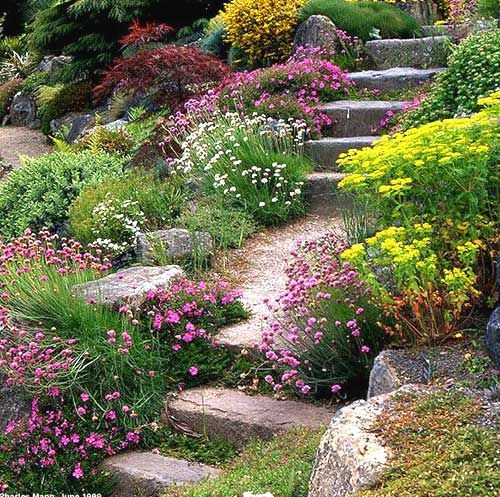
Photo:Credit
It’s not difficult to enjoy a beautiful drought-tolerant garden simply by making the right of succulents and colorful grasses.
But if you prefer seeing flowering in your yard, go for drought-tolerant perennials:
- Gaillardia (also known as the Blanket flower) – coming in red, yellow and orange daisy-like flowers
- Perovskia atriplicifolia (commonly called Russian sage) – scented, delicate silver leaves with soft purple flowers
- Salvia divinorum (from the mint family) – bold crimson-red blooms
- The loved by everyone Lavender – aromatic and colorful
- Anigozanthos (also knows as Kangaroo Paw) – a number of species in bright vivid colors typical for Western Australia that are unique bird attractors
The native plants are the base of a pretty garden ( they are also used to lack of water, which makes them excellent choice for drought resistant landscape ) . Here are some tips and ideas to follow:
- Find some native plants, like Achillea millefolium (or Yarrow), which regularly has constitutional drought-tolerant traits.
- Water loss and suppresses weeds could be reduced by spreading about 3 inches of mulch between widely-spaced plants
- Install a drip-irrigation system. It wastes less water and delivers hydration straight to the plants.
- In this garden, easy components, as well as a basin and picket bench, provide delicate focal points.
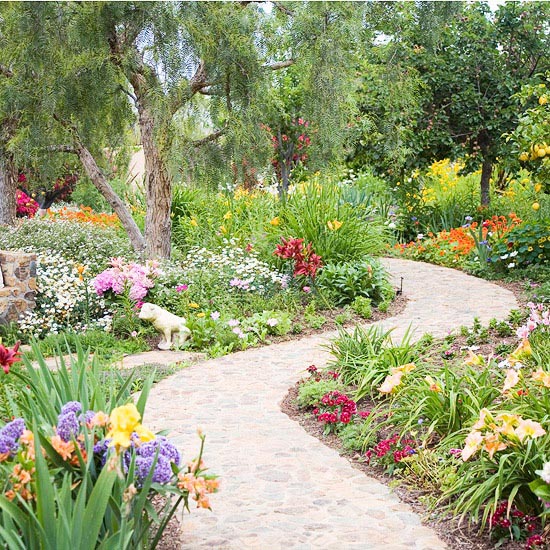
Here are some smart ways to prevent a water loss:
- Use drought plants, such as Lavender and Sage.
- Water flee usually happens on sidewalks, driveways, and other hardscapes. You can easily reduce moisture runoff by planting a strip next to the hardscapes.
- You can also try to reduce the amount of grass, especially during the hot months (July and August), as it sucks your yard dry.
- Very high containers elevate plants to add volume and texture to the landscaping.
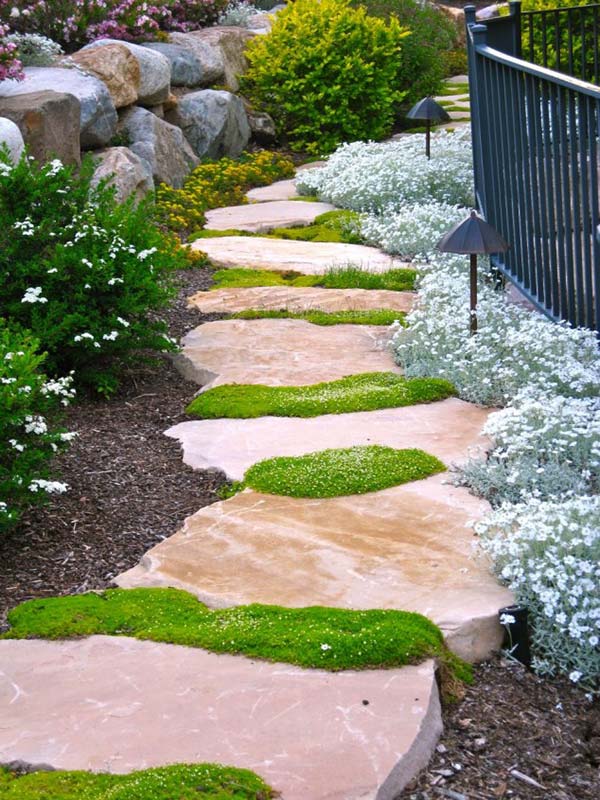
Hardscape parts could be a bit of a challenge of a drought-resistant garden.
- Choose shrubs and evergreens that, once established, don’t need lots of watering.
- Mulch is essential for keeping the soil moisturized, improving its health.
- Mosses are living in shady areas. They aid in soil erosion. Moreover, they are absorbing water and providing moist to other species.
- If you have pavers, put some thyme around them to prevent accumulation of heat
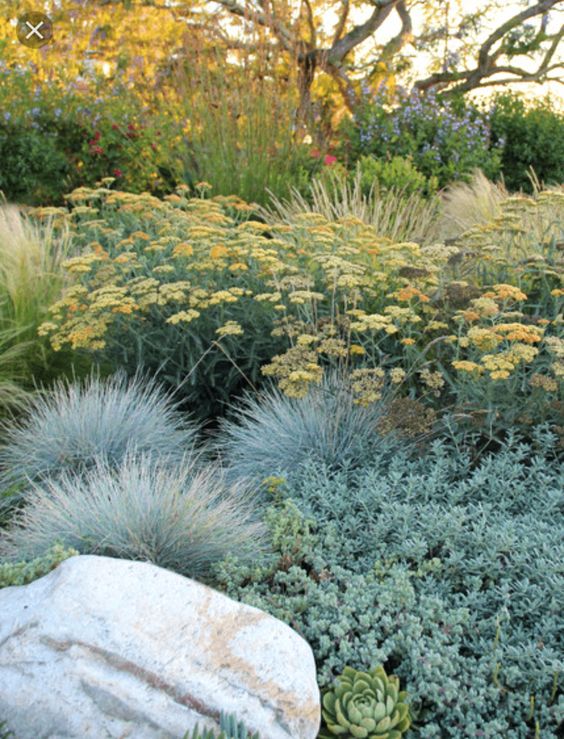
Photo:Credit
I would like to share some water-saving strategies for a drought-resistant landscape design:
- Group the plants with identical water requirements together.
- Add the right amount of soil adjustments to the water-smart plants, such as natural compost
- A tall outdoor light is providing accentuate and security to the drought-tolerant landscape.
- Various types of evergreens (Bearberry, Oregon grape, Blue holly, Common boxwood etc.) create a nice structure and color.
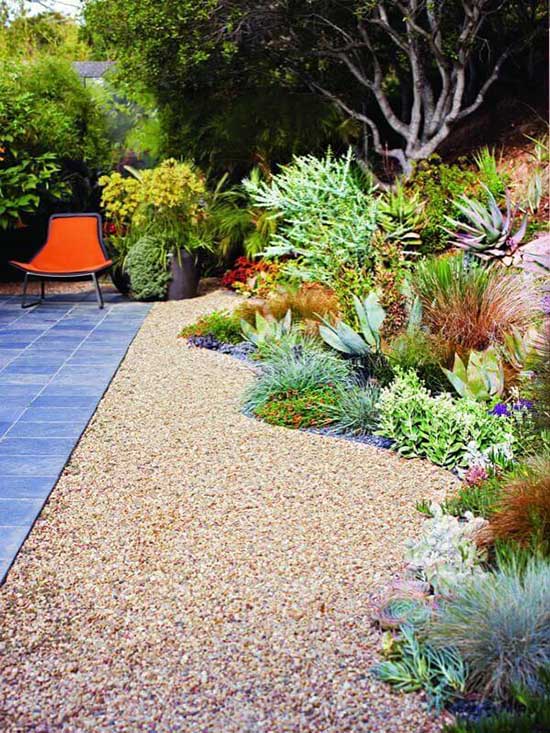
Photo:Credit
Using pea gravel in the backyard (or front yard, patio, driveway, walkway) is a smart way to reduce your dependence on watering, chemical fertilizers, and mowing to keep it nice and tidy.
Planting some drought tolerant plants would add the final sparkle to your landscaping.
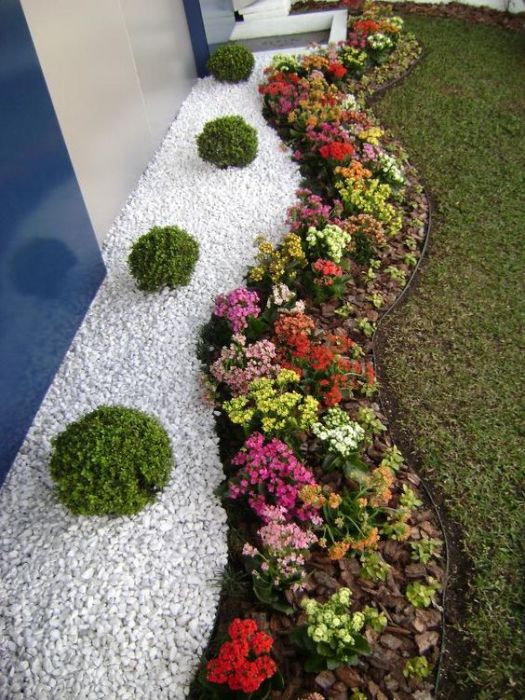
Photo:Credit
You can create a spectacular composition by using small pebbles and short perennial flowers that don’t require much watering. Some of them are:
- Rockcress (Arabis caucasica)
- Snow in Summer (Cerastium tomentosum)
- Tickseed (Coreopsis)
- Pinks (Dianthus)
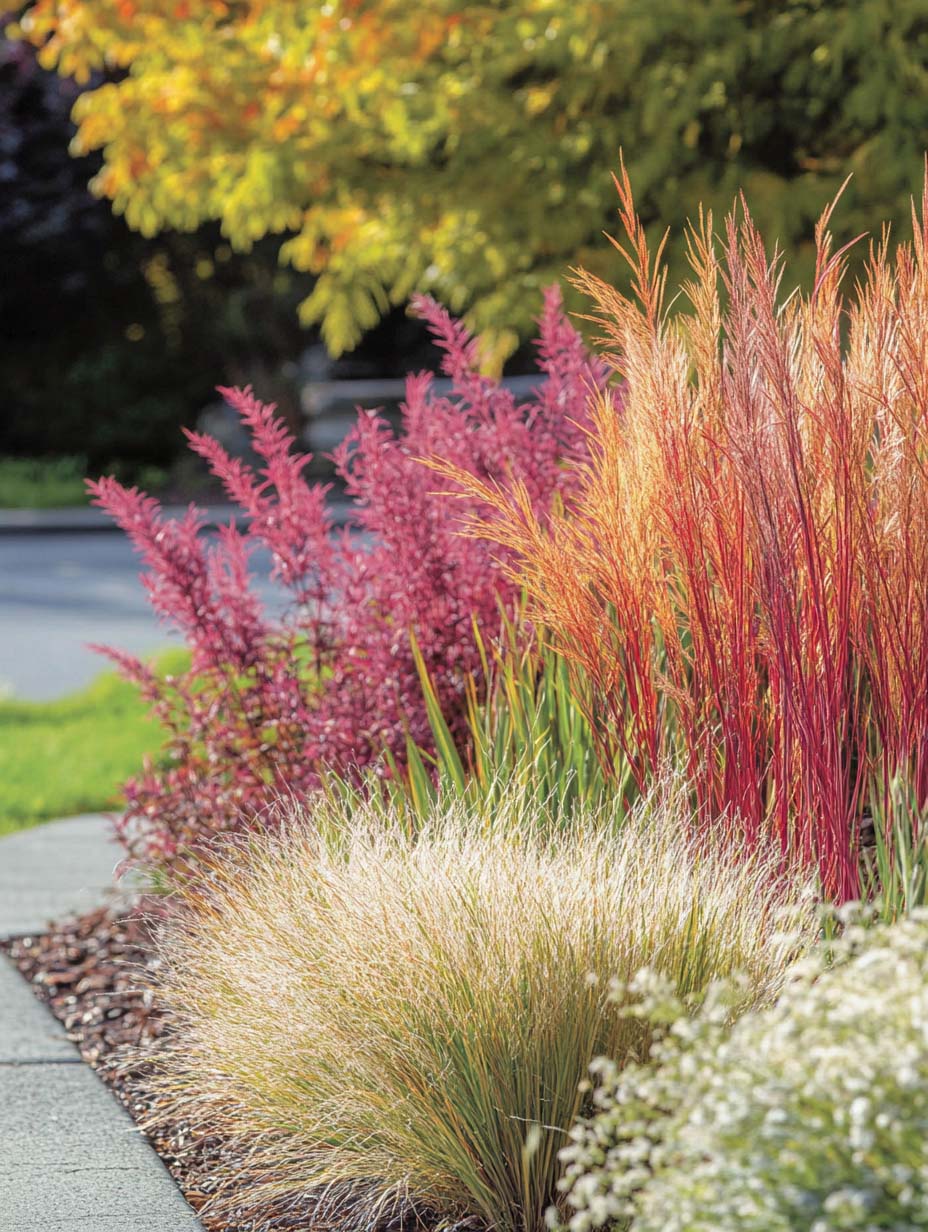
Photo:Credit
Foliage plants shine in this drought-tolerant garden.
- Many water-smart plants, such as the Japanese blood grass, give less-visible blooms but make up for it with intriguing foliage.
- The mixture of grass and concrete in several curb strips does not do a lot to stem water loss, however, this planted version catches water before it hits the road.
- In place of grass, choose drought-tolerant plantings, which are more likely to prevent erosion.
- Shade can be also an essential element in the fight against moisture loss.
- Colorful grasses and Mugworts (also knows as Artemisia) offer healthy green foliage in this drought resistant.
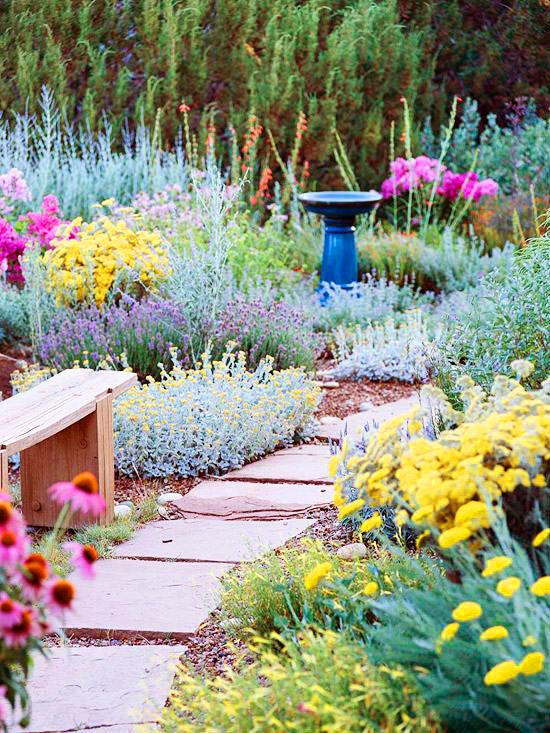
Photo:Credit
An attractive garden bed relies on native plants.
- Research native plants, such as yarrow, which often has built-in drought-tolerant features.
- Spread 2-3 inches of mulch between widely-spaced plants; this reduces water loss and suppresses weeds.
- Install a drip-irrigation system. It wastes less water and delivers hydration directly to the plants.
- In place of mortar, a porous material between paving stones provides another way for rain to soak into the soil.
- In this garden, simple elements, including a birdbath and wooden bench, offer subtle focal points.
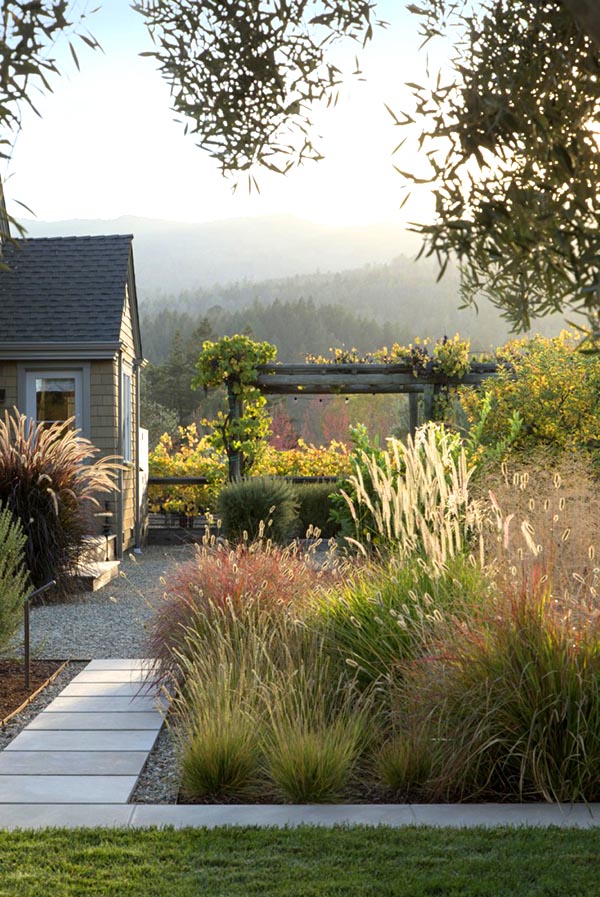
Photo:Credit
A sudden burst of color comes from a group of decorative grasses.
Water naturally runs down slopes, even little ones.
Thymus serpyllum (well-known as Breckland thyme, Breckland wild thyme, creeping thyme, wild thyme, or elfin thyme) at rock bottom of a gravel path helps stop water loss during this garden.
Tucked unobtrusively within the landscape, a cistern offers associate eco-smart thanks to recycling downfall.
Make pathways from a porous material, like gravel, rather than non-permeable concrete that the soil will absorb some water before it runs off.
Ornamental grasses supply color and structure during this drought-resistant garden. Purple catnip and Allium edge the gravel path during this bed.
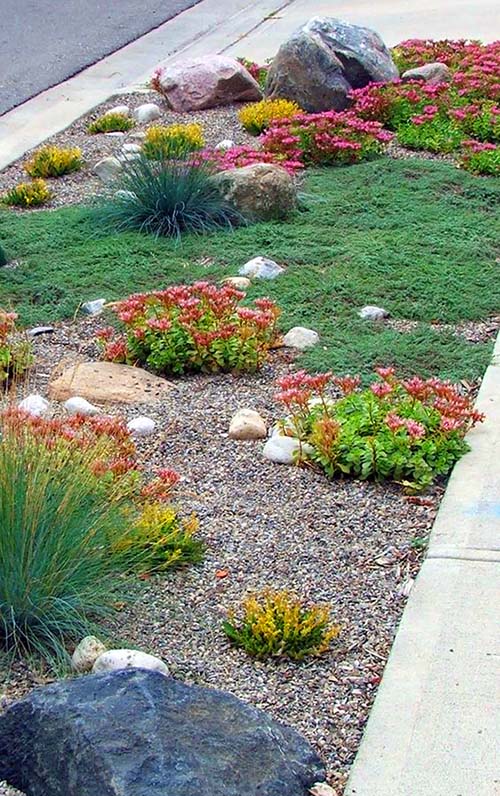
Photo:Credit
I really love this minimalistic approach – with a gravel mulch you have an eye-catching background while the plants have room to spread freely.
Blue oat grass (or Helictotrichon sempervirens), sedum, thyme, large and small rocks. This is a very well-done drought-tolerant landscaping.
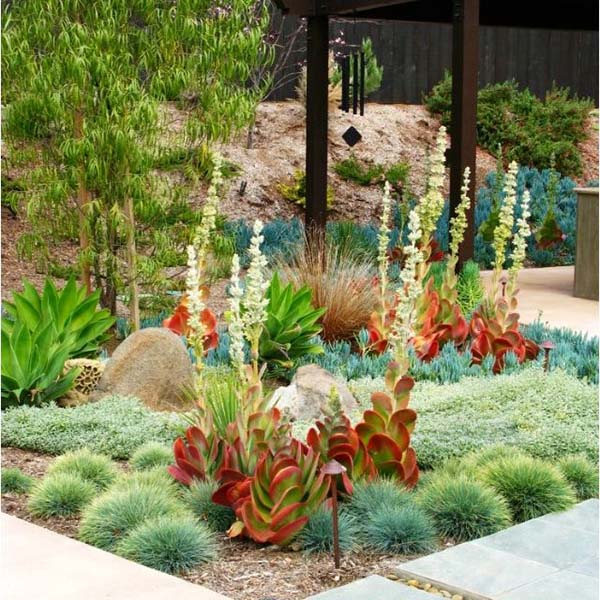
Photo:Credit
This beautiful drought-resistant landscaping is a combination of succulents, Mondo grass (well-known as monkey grass), and Liriope spicate. You can create flower beds with similar plants.
Once established, it is very easy to look after the monkey grass and you can basically forget it is in your yard unless it’s time to divide it.


